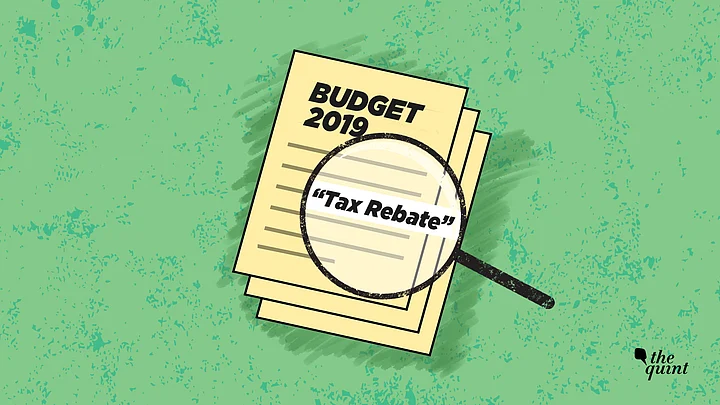One of the biggest takeaways from the interim budget presented by Finance Minister Piyush Goyal on Friday, 1 February, was the announcement of a full tax rebate for annual incomes up to Rs 5 lakhs.
In his speech, Goyal described the measure as follows:
“Individual taxpayers having taxable annual income up to 5 lakhs will get full tax rebate and therefore will not be required to pay any income tax. As a result, even persons having gross income up to 6.50 lakhs may not be required to pay any income tax if they make investments in provident funds, specified savings, insurance etc. In fact, with additional deductions such as interest on home loan up to 2 lakh, interest on education loans, National Pension Scheme contributions, medical insurance, medical expenditure on senior citizens etc, persons having even higher income will not have to pay any tax. This will provide tax benefit of 18,500 crore to an estimated 3 crore middle class taxpayers comprising self employed, small business, small traders, salary earners,pensioners and senior citizens.”Budget Speech, available at https://www.indiabudget.gov.in/bspeecha.asp
But what exactly does this mean? Has the tax slab been changed? Is income upto Rs 5 lakhs exempted from income tax? Will this affect anyone earning more than Rs 5 lakhs?
There has been some confusion about this online, with even some BJP leaders mistakenly calling this a change to tax exemptions and tax slabs.
Here’s what this proposal is actually about.
Does this proposal in the interim budget make any changes to the tax slab?
No, the rebate does not affect the tax slabs. The exemption limit is therefore still Rs 2.50 lakhs, ie, you are exempted from paying tax on taxable income (income minus relevant deductions) of upto Rs 2.50 lakhs per year.
If your income is above Rs 2.50 lakhs, you are liable to tax, depending on how much your income is. The amount of tax you pay can, however, be reduced if you are eligible for any tax rebates.
A rebate is therefore a reduction in the amount of tax you are required to pay. It is different from a refund, which you get after first paying the tax. It is also different from an exemption, which reduces your taxable income.
The Existing Position on Rebates
Were tax rebates already available for individuals with low incomes?
The concept of a tax rebate for individuals with low incomes was introduced with effect from 1 April 2014 by the UPA-II government, as Section 87A of the Income Tax Act 1961.
It allowed people with incomes under Rs 5 lakhs to claim a reduction of their income tax by 100 percent, although the maximum reduction that could be claimed was Rs 2,000.
How did the rebate work prior to the new proposal?
The Modi government amended Section 87A in 2018 to restrict it to individuals earning Rs 3.50 lakhs or less, and over the years the maximum rebate that could be claimed was changed a couple of times.
Before the interim budget today, the rebate applied to individuals earning Rs 3.50 lakhs or less, and the maximum rebate was Rs 2,500.
To illustrate, if your total income after deductions was Rs 3.10 lakhs, the total amount of tax you were liable to pay was Rs 3,000. Because of the rebate in section 87A, this would be reduced to Rs 500.
How The Budget Proposal Changes Things
How does the interim budget proposal affect this tax rebate?
The proposal in the budget would once again make the rebate applicable to any individual whose total annual income (after making relevant deductions) is Rs 5 lakhs or less.
What makes the budget proposal so significant, however, is that it increases the maximum rebate that can be claimed to Rs 12,500. Since this was the maximum amount of tax payable by anyone with taxable income up to Rs 5 lakhs, this effectively means that anyone earning less than Rs 5 lakhs per year will not have to pay any tax at all.
Does this rebate apply to anyone earning more than Rs 5 lakhs per annum?
Eligibility for the rebate under Section 87A depends on your total annual income after relevant deductions. Such deductions can be for any amounts invested in provident funds, insurance and certain investment plans. The maximum amount of deductions you can generally claim is Rs 1.5 lakhs.
As a result, anyone whose total earnings is between Rs 5 lakhs and Rs 6.5 lakhs could still be eligible for the tax rebate, provided they’ve made enough investments to reduce their taxable income to Rs 5 lakhs or lower.
If your income after reductions is even Re 1 more than 5 lakhs, you will not be eligible for the rebate at all.
For example, if you are earning Rs 60,000 a month, your total income before deductions is Rs 7.2 lakhs. Even if you’ve made Rs 1.5 lakhs worth of relevant investments, your taxable income is Rs 5.7 lakhs, ie, greater than Rs 5 lakh. You will therefore have to pay the full amount of income tax based on your tax slab – which remains unchanged.
When would the change become applicable?
The full tax rebate comes into force on 1 April 2020. This means you cannot claim it when filing your tax returns for the financial years 2018-19 or 2019-20.
You can find the proposal in Clause 8 of the Finance Bill 2019, available here.
